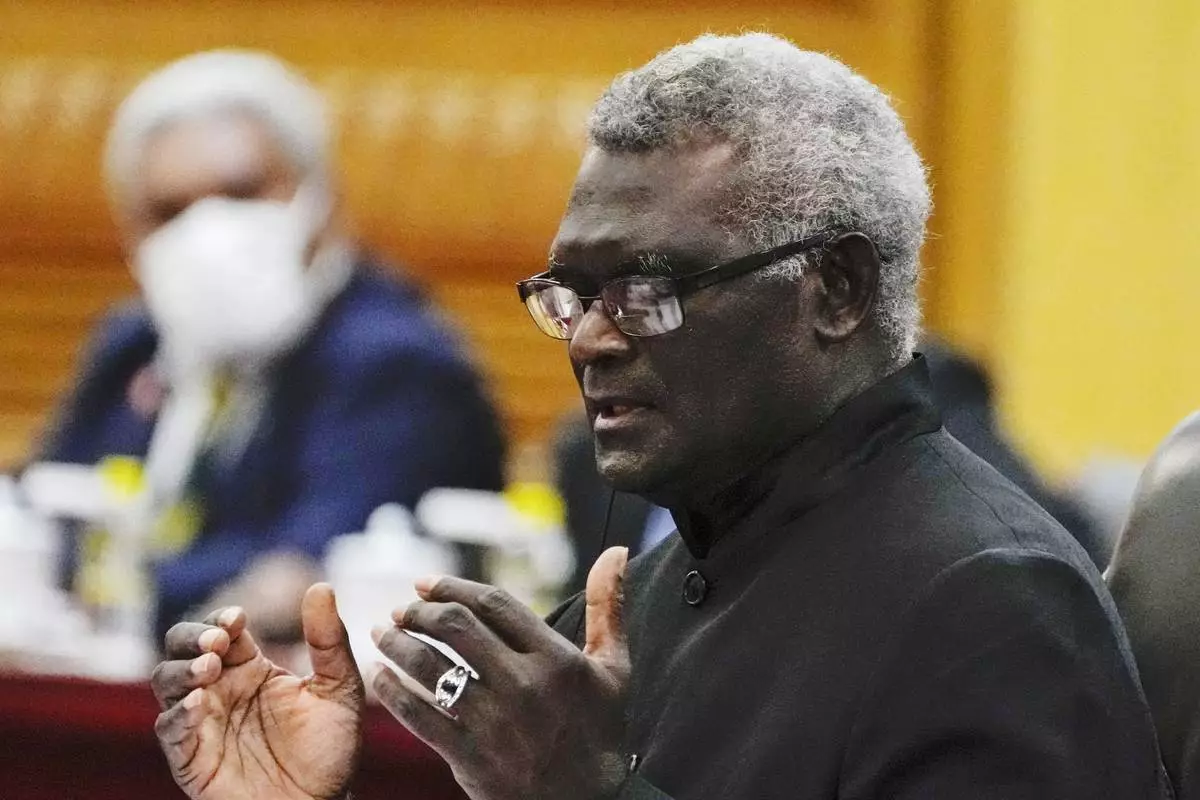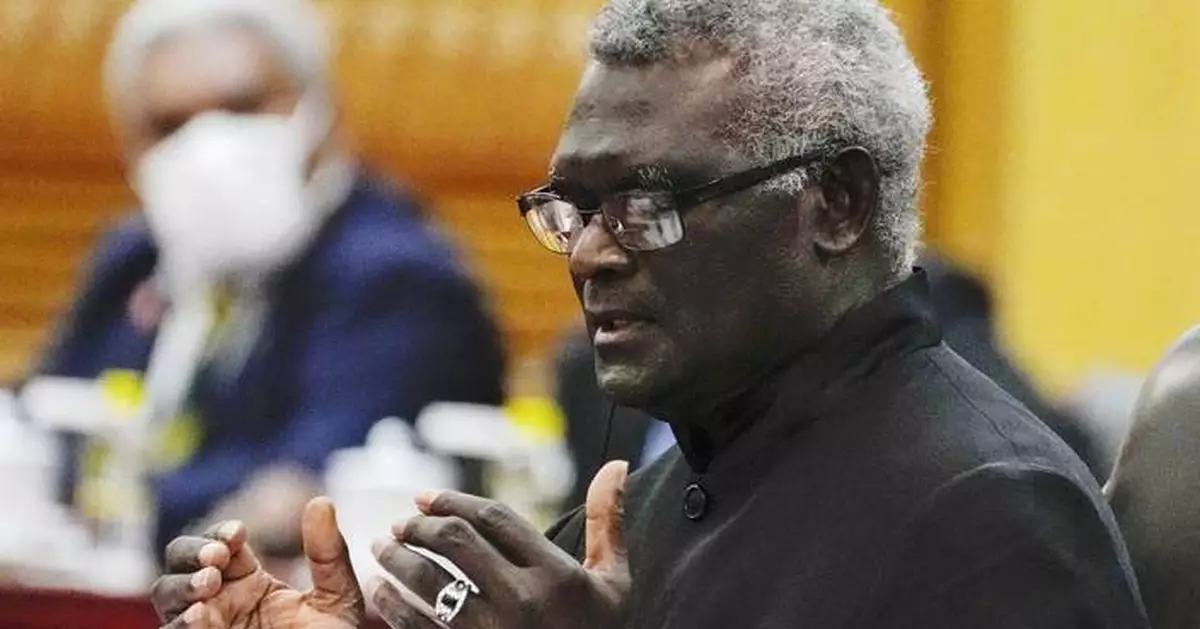MELBOURNE, Australia (AP) — Solomon Islands pro-Beijing Prime Minister Manasseh Sogavare on Monday withdrew from the contest to remain head of the strategically important South Pacific island nation’s government following general elections two weeks ago that are central to the U.S.-China rivalry in the region.
Sogavare has been reelected to the parliament. But he told a news conference in the capital Honiara on Monday he would not be nominated as a candidate when the 50 newly elected lawmakers vote on Thursday for the prime minister, Australian Broadcasting Corp. reported.
Sogavare had hoped to become the first Solomons prime minister to maintain power in consecutive four-year terms following the April 17 election. During his previous term, China’s influence increased more in the Solomons than anywhere else in the South Pacific.
Sogavare switched diplomatic allegiances from Taiwan to Beijing and struck a secret security pact that has raised fears of the Chinese navy gaining a foothold in the region.
Sogavare said in his press conference he had been “vilified by media” and his family had been subjected to “unprecedented abuse,” the ABC reported.
Sogavare’s Ownership, Unity and Responsibility Party, known as the Our Party, won 15 seats in the election, more than any other party. The party’s candidate to become prime minister will be Foreign Minister Jeremiah Manele.
A prime minister needs the support of at least 26 lawmakers in the 50-seat chamber.
Observers expect China to have secretly backed more candidates than Sogavare at the election in a bid to ensure the government change does not diminish Beijing’s influence.
Sogavare could again return to power during the current four-year term. He was elected prime minister after the last election in 2019. But he has served as prime minister three times before 2019 because his predecessors had quit or were ousted by fellow lawmakers in a precarious political system.

Candidate for prime minister Jeremiah Manele speaks during a news conference, Monday, April 29, 2024, in Honiara, Solomon Islands. Solomon Islands Prime Minister Manasseh Sogavare on Monday withdrew from the contest to remain head of the strategically important South Pacific island nation’s government following general elections two weeks ago that are central to the U.S.-China rivalry in the region. (Australian Broadcasting Corporation via AP)

Outgoing Solomon Islands Prime Minister Manasseh Sogavare, right, and candidate for prime minister Jeremiah Manele shake hands during a news conference, Monday, April 29, 2024, in Honiara, Solomon Islands. Sogavare on Monday withdrew from the contest to remain head of the strategically important South Pacific island nation’s government following general elections two weeks ago that are central to the U.S.-China rivalry in the region. (Australian Broadcasting Corporation via AP)

In this image taken from video, outgoing Solomon Islands Prime Minister, Manasseh Sogavare speaks during a news conference, Monday, April 29, 2024, in Honiara, Solomon Islands. Sogavare on Monday withdrew from the contest to remain head of the strategically important South Pacific island nation’s government following general elections two weeks ago that are central to the U.S.-China rivalry in the region. (Australian Broadcasting Corporation via AP)

FILE - Visiting Solomon Islands Prime Minister Manasseh Sogavare speaks during a bilateral meeting with his Chinese counterpart Li Qiang at the Great Hall of the People in Beijing on July 10, 2023. Solomon Islands pro-Beijing Prime Minister Manasseh Sogavare on Monday, April 29, 2024, withdrew from the contest to remain head of the strategically important South Pacific island nation’s government following general elections two weeks ago that are central to the U.S.-China rivalry in the region. (AP Photo/Andy Wong, Pool, File)
LOUISVILLE, Ky. (AP) — The cheers were endless Saturday in the PGA Championship, and when another record day of scoring finally ended at vulnerable Valhalla, so were the possibilities.
Xander Schauffele and Collin Morikawa were tied for the lead. Shane Lowry thrust his way into the mix with a 62 to tie a major championship record last set just two days earlier. Bryson DeChambeau chipped in for eagle on the last hole to set off a wild celebration.
And all Scottie Scheffler could do during all this chaos — at least it was inside the ropes this time — was listen to them.
Scheffler's remarkable streak of 42 consecutive rounds at par or better finally ended in the second-lowest scoring average for a Saturday at the PGA Championship. He faded early, never quite recovered and shot 73 to finish eight shots back with 23 players ahead of him.
“Too many mistakes,” Scheffler told CBS. He declined to speak to reporters. “I came out here hoping to have a good round and didn’t get it done.”
Schauffele, who opened the week with a 62 that felt easy, labored to stay in front and was two shots ahead until a 9-iron came out hot and sailed over the green at the 15th. With water on the other side of the green, he was careful with a chip out of shin-high grass and moved it 10 feet. He chipped on and two-putted for a double bogey, only his second hole over par this week.
Schauffele bounced back with two closing birdies for a 3-under 68.
Morikawa briefly took the lead with a 6-foot birdie putt that went 360 degrees around the cup before dropping on the 15th, and he holed a 10-foot birdie on the 18th for a 67 to tie Schauffele. They were at 15-under 198 with plenty of company.
Sahith Theegala birdied six of his last 10 holes for a 68 and was one shot behind. Another shot back was the trio of Lowry, DeChambeau (67) and Viktor Hovland (66) — a British Open champion, U.S. Open champion and FedEx Cup champion.
And it didn't stop there. Fifteen players were separated by five shots.
“There are a ton of guys who can do it tomorrow,” Morikawa said.
The shocker was Scheffler not being among them.
Scheffler was coming off the most heart-racing day of his career that featured an arrest for not following police orders, brief jail time and a 66 to get into contention for a second straight major. But he was never a factor after an early stretch of double bogey-bogey-bogey.
“I definitely did not feel like myself today,” he said. “Yesterday happened, I did my best to recover from it and come out and compete. This morning was not my usual routine for a round. At the end of the day, I came out hoping to have a good round but I wasn’t able to get it done, which was frustrating.”
Even at the home of the Kentucky Derby, this final round could be tough to handicap.
Lowry's magnificent performance — he made 161 feet worth of putts — ended with a wedge to just inside 12 feet and a clear shot at 61, only to not give the putt enough pace.
“Probably the most disappointed anyone can ever be shooting 62,” Lowry said. “Look, I went out there with a job to do today, and my job was to try to get myself back in the tournament. And I definitely did that.”
DeChambeau had only three birdies and didn't get much out of his round until he chipped in for his eagle, a moment so loud it was hard to tell if he or the thousands of fans were more excited. He said he hasn't felt that kind of energy since his 58 to win LIV Golf Greenbrier last year.
“Exhilarating,” he said. “That was pretty exciting there. I was pretty pumped. I’ve got a good chance. I’m not executing to the level that I know I can, but playing well enough to give myself a chance, obviously.”
Justin Rose (64) was three shots back. The group five behind at 10-under 203 included Justin Thomas, the Louisville native who felt chills on a steamy day of sunshine when he hacked out of the weeds, down to the green and into the cup on the par-3 14th for a most unlikely birdie. He shot 67.
That's 15 players at 10 under or better, the most through 54 holes in major championship history. The previous record was seven players, most recently at St. Andrews in 2022.
The scoring average for the third round was 69.55, a fraction behind the record for the PGA Championship set at Bellerive in 2018.
This was the day to go low just to stay in the hunt. Scheffler, using fill-in caddie with regular looper Ted Scott attending his daughter's high school graduation in Louisiana, was in trouble from the start — a double bogey on No. 2 from mangled rough, a tee shot into a hazard left of the reachable par-4 fourth hole.
He was 4 over through four holes, and on three occasions he followed a birdie with a bogey. It was his highest score since a 73 in the third round of the Tour Championship last August.
Now the focus turns to Schauffele, the Olympic gold medalist from the Tokyo Games in 2021 who is trying to bag a silver prize — the heavy Wanamaker Trophy — for his first major. Schauffele has been leading or tied in six of his last seven rounds.
The exception was losing a 54-hole lead last week to Rory McIlroy's closing 65 at Quail Hollow.
“I just need to stay in my lane, and hopefully it's enough,” Schauffele said.
Morikawa already had two majors at age 24 and is slowly working his way back to that smooth, repeatable swing. He had one early wobble missing a 4-foot par putt on the second hole, and that was really his only big mistake.
There was no shortage of candidates to claim the second major of the year. It was crowded at the top, just like it was at Harding Park in 2020, when a dozen players were separated by three shots going into the final round. Morikawa emerged with his first major.
“Look, I’ve played against all these guys. It’s not like any of these guys are new,” Morikawa said. “They all have their accolades within themselves, and really anyone can go low.”
AP golf: https://apnews.com/hub/golf

Xander Schauffele hits from the fairway on the 17th hole during the third round of the PGA Championship golf tournament at the Valhalla Golf Club, Saturday, May 18, 2024, in Louisville, Ky. (AP Photo/Jeff Roberson)

Sahith Theegala waves after making a putt on the 18th hole during the third round of the PGA Championship golf tournament at the Valhalla Golf Club, Saturday, May 18, 2024, in Louisville, Ky. (AP Photo/Sue Ogrocki)

Sahith Theegala reacts to his shot from the fairway on the 18th hole during the third round of the PGA Championship golf tournament at the Valhalla Golf Club, Saturday, May 18, 2024, in Louisville, Ky. (AP Photo/Jeff Roberson)

Bryson DeChambeau celebrates after a eagle on the 18th hole during the third round of the PGA Championship golf tournament at the Valhalla Golf Club, Saturday, May 18, 2024, in Louisville, Ky. (AP Photo/Sue Ogrocki)

Bryson DeChambeau celebrates after a eagle on the 18th hole during the third round of the PGA Championship golf tournament at the Valhalla Golf Club, Saturday, May 18, 2024, in Louisville, Ky. (AP Photo/Sue Ogrocki)

Shane Lowry, of Ireland, celebrates after a birdie on the 13th hole during the third round of the PGA Championship golf tournament at the Valhalla Golf Club, Saturday, May 18, 2024, in Louisville, Ky. (AP Photo/Matt York)

Justin Rose, of England, greets Shane Lowry, of Ireland, after the third round of the PGA Championship golf tournament at the Valhalla Golf Club, Saturday, May 18, 2024, in Louisville, Ky. (AP Photo/Jeff Roberson)

Scottie Scheffler reacts to his chip to the green on the fourth hole during the third round of the PGA Championship golf tournament at the Valhalla Golf Club, Saturday, May 18, 2024, in Louisville, Ky. (AP Photo/Jeff Roberson)

Scottie Scheffler waits to play on the second hole during the third round of the PGA Championship golf tournament at the Valhalla Golf Club, Saturday, May 18, 2024, in Louisville, Ky. (AP Photo/Jeff Roberson)

Collin Morikawa hits from the fairway on the 18th hole during the third round of the PGA Championship golf tournament at the Valhalla Golf Club, Saturday, May 18, 2024, in Louisville, Ky. (AP Photo/Jeff Roberson)

Collin Morikawa waves after making a putt on the 18th hole during the third round of the PGA Championship golf tournament at the Valhalla Golf Club, Saturday, May 18, 2024, in Louisville, Ky. (AP Photo/Sue Ogrocki)

Xander Schauffele watches his tee shot on the fourth hole during the third round of the PGA Championship golf tournament at the Valhalla Golf Club, Saturday, May 18, 2024, in Louisville, Ky. (AP Photo/Matt York)

























